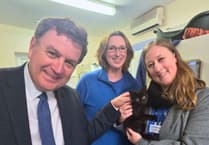A LEADING West Devon vet has accused his MP of betraying local farmers after he failed to back an amendment to a Government bill designed to protect UK farmers from being undercut by cheap foreign imports.
Jonathan Hobbs, a director at North Park Vets in North Tawton, has written to Conservative Central Devon MP Mel Stride demanding answers.
He says he is ‘appalled’ at the MP’s actions in voting against fellow Devon Tory MP Neil Parish’s amendment to the Agriculture Bill last month. The amendment, put forward by Mr Parish, tabled after fierce lobbying by the National Farmers’ Union, would have barred food imports produced to standards lower than those in the UK.
Torridge and West Devon MP Geoffrey Cox also failed to back the amendment, even though 22 Tory MPs defied the Government whip to do so. It was defeated by 51 votes, 277 votes for to 328 votes against, in the third reading in the House of Commons of the bill setting out the UK’s agriculture policy post-Brexit.
Celebrity chef and food campaigner Jamie Oliver has backed a petition from the NFU voicing outrage at the decision.
The vet said his clients in the Okehampton area would be badly affected by the move.
‘Most of the farming in Mel Stride’s constituency are beef and sheep which is the cornerstone of farming in the South West. As a vet I’m obviously concerned because this would affect my business but I am also trying to defend my clients.
‘I have worked hard with them to promote animal welfare and been active in reducing antibiotic usage. To then be exposed to products of an inferior standard which potentially pose a risk to both animal and human health is completely unacceptable.
‘Health and welfare costs money and to allow imports which are been produced to lower standards than ours means that UK farmers won’t be able to compete on a level playing field,’ he added. ‘Essentially this means farmers will go out of business, which is clearly not in the best interests of British farming.’
He said the environment would be harmed too, as livestock farming on permanent pasture, as practised by his clients, acted as a ‘carbon sink’, and maintained a landscape crucial for tourism.
He said Mr Stride’s reply to his first letter was ‘unacceptable’.
‘The crux of what he said is that he agreed in principle with the amendment but couldn’t vote for it because the Government would have to reassess the trade deals with all other countries before the December deadline [for leaving the EU] to ensure that they met the same standards as the UK, and that there wasn’t time to do it.
‘Firstly, the December deadline is entirely of the Government’s own making. Also, he has basically admitted that this has been done because they ran out of time to carry out due diligence so they have let it through anyway. That is just completely unacceptable. As a vet, if I made decisions without due diligence I would be struck off.’
A statement issued on behalf of Mr Stride said: ‘While Mel wholeheartedly agreed with the aim, he feared that the assessment brought with it unintended consequences. For example, it would require an assessment of all our trading partners’ standards for those trade deals from which we benefit and for this to be completed by the end of December in order to allow for the rollover of these arrangements. Mel does not think that this is realistic and that if these trade deals are not rolled over, it could well be to the detriment of our farmers and others.’
The Government’s ‘clear manifesto commitment to uphold our standards’ would still be met, the statement continued. ‘At the end of the EU transition period, the Government will maintain the same import standards. No UK import standards will be diminished as part of a free trade agreement (FTA).’





Comments
This article has no comments yet. Be the first to leave a comment.